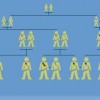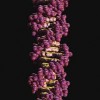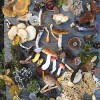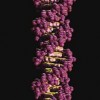Erin McKechnie
This user hasn't shared any biographical information
Posts by Erin McKechnie

The Confusion About Adaptation
Dec 7th
One of the most difficult concepts to teach anyone is the relationship between evolution and adaptation. The majority of people I have worked with, both adults and children, are confused about this to some extent. Let’s first create a simple story to frame our discussion.
Once upon a time, in a forest with leaves and soil on the ground, there is a family of rabbits. Many animals live in this forest, including several predators for the rabbits. The mom and dad are both brown rabbits and most of their rabbit children are also brown. One of the children was born with More >

Does New DNA Always Mean New Traits?
Nov 10th
I was teaching a class of fifth grade students last week and we were discussing the characteristics of DNA and cells. As a group, we described how the human body is made up of a variety of cell types, including muscle cells, nerve cells, and more. I explained that although cells can be diverse in their appearance and functions, within one organism they all have the same DNA (except for mature red blood cells and gametes). The reason that a nerve cell is different from a bone cell is simply that they use different recipes in different ways.
A student then More >

Diverse Proteins
Oct 14th
The instructions for life are carried in the DNA of our cells. All day long, our cells read the information in our DNA and make proteins. While DNA contains recipes for how life works, proteins are molecules that I consider the “doers” in our cells.
Protein is a broad category that includes enzymes and hormones. When you eat an apple, your body produces enzymes to break down that apple and build new products for your body. If you have a lot of glucose (a type of sugar) in your blood, the cells in your pancreas will read the gene for insulin More >

Passing on Genes and Traits
Sep 9th
Why do you look the way you do? There are many ways to answer this question, but essentially it all comes down to the information in your DNA and the proteins your cells make. Your DNA contains genes that code for proteins. Different proteins have different functions, each contributing to your various traits and functions.
Why do we often see similar traits among parents and offspring? We inherit our DNA from our mother and father. This means we have half of our genes, or recipes, from our mom and half from our dad. Even with this basic idea, it can be More >

Teaching Genetics: Simplicity for Success
Sep 2nd
I love to talk about the biology behind how life works with other people. Some of the best conversations I have ever had have been with fifth graders learning about DNA. I am amazed that they know an incredible amount of information relating to genetics, way more than I ever knew when I was their age.
I currently teach genetics and molecular biology to middle school students, high school students, teachers, and the general public. One of the greatest skills I have learned in my current position is the importance of engaging your audience and making the material you are introducing More >
